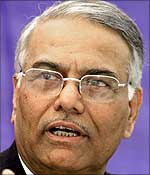|
|
| Help | |
| You are here: Rediff Home » India » Business » Report |
|
 | ||
 Former finance minister Yashwant Sinha. Photograph: Farooq Naeem/AFP/Getty Images | ||
| |||||||||||||||||||||||||||||||||||||||||
|
| |||||||||||||||||||||||||||||||||||||||||
Last Updated: June 20, 2007 16:16 IST
Yashwant Sinha has been India's finance minister and he can rightly take the credit for making the path of reforms in India less arduous. He did make the VAT reforms happen and he gives due credit for this to the finance ministers of all the state governments because they agreed to deliver on it.
In his memoir, Confessions of a Swadeshi Reformer, he tells this story. He says that the status quo mentality must go and this can be done at the state level rather than the central level because it's the state which must initiate developmental processes, maintain and carry them forward.
In essence, the states must deliver on services, and if that happens, then people will buy into the reforms story.
But he adds in this memoir that there were other areas of reforms that were clearly left untouched, not only in 1991 but even in subsequent budgets.
He told CNBC-TV18, "I would have definitely tried to tackle them." He does say that labour reforms are the most contentious of them all, and he tried and did not succeed with regard to them.
But he feels that 1991 was the year when the issue of labour reforms should have been tackled because at that psychological moment of crisis, politicians would have put aside their personal agendas and pushed the reforms through.
So, the 1991 liberalisation of the economy award went to Manmohan Singh, but Rajiv Gandhi let off lightly for putting his party's politics before the country's well being. In his book, Sinha called Rajiv Gandhi's decision to not present a proper budget as 'criminal.'
Sinha explains, "Anyone who had a brief acquaintance with the economic situation of India at that point in time could not have taken a step of that kind, and Rajiv Gandhi certainly knew the kind of mess we were in. I was completely shocked because that left us with no options and which is why I was disappointed."
But during his own tenure as the finance minister, he was known more as the 'Rollback Sinha' because of the reforms that he said he wanted implemented but political pressure from his allies kept him from realising them.
In his book, he talks about how he and the then prime minister (Atal Bihari Vajpayee) had decided to cut down on fertiliser subsidy and increase the price of fertilisers and this move created such a furore, even among his own party members and allies, that he had to eat his own words, so to speak.
This book is Yashwant Sinha at his candid best because there are instances where he cites that he felt that people in his own party may have been envious of him because he had only joined the BJP in 1993 and only five years later, in 1998, he was appointed the finance minister of the country. He says, "There were people in the party who felt I had gone up too fast, and who probably felt that I didn't deserve to be where I was."
Sinha feels that economic historians have yet to write about 1991 -- the year of liberalisation -- and so when his budgets come to be judged, analysed or written about, then he hopes history looks at them in a kindly manner. Otherwise, he has already cleared the air in this memoir. . . so, all the historians would have to do is read this book!
For more on management, log on to www.moneycontrol.com
|
|
| © 2007 Rediff.com India Limited. All Rights Reserved. Disclaimer | Feedback |